Mazda Demio
The Mazda2 is a subcompact/supermini/B-segment small car manufactured and marketed globally by Mazda since 1996, currently in its fourth generation. The Mazda2 was previously marketed as the Mazda Demio (a name it kept in some markets until 2019) and as the Mazda 121 and Mazda Metro.
| Mazda2 | |
|---|---|
_Genki_hatchback_(2018-08-27)_01.jpg.webp) 2015 Mazda2 (DJ) Genki hatchback | |
| Overview | |
| Manufacturer | Mazda |
| Also called | Mazda Demio (1996–2019) |
| Production | 1996–present |
| Body and chassis | |
| Class | Subcompact/Supermini (B) |
| Layout | Front-engine, front-wheel-drive |
| Platform | Mazda D platform |
| Chronology | |
| Predecessor | Ford Festiva/Mazda 121 Autozam Revue |
The Mazda2 is based on the Mazda D-platform and was preceded by two other small cars based on the platform: the Ford Festiva (designed and built by Mazda for Ford and also sold as the Mazda 121) that was introduced in 1986 on the DA platform and the Revue (sold by Mazda's Autozam marquee) introduced in 1990 on the DB platform. The Mazda Demio added the DW platform in 1996. The name "Demio" is derived from Latin meus to show possession, which in many Romance languages has become "mio."
The third generation Demio earned the 2008 World Car of the Year title,[1] while the fourth generation was awarded the 2014–2015 "Japanese Car of the Year".[2]
Several generations of the Mazda2 have been rebadged and sold by other manufacturers. The first generation was sold as the Ford Festiva Mini Wagon in some markets and the fourth generation was sold in North America as the Scion iA and Toyota Yaris/Yaris iA.
First generation (DW; 1996)
| First generation (DW) | |
|---|---|
_Metro_Limited_Edition_hatchback_(2015-07-03)_01.jpg.webp) Mazda 121 Shades Metro (Australia) | |
| Overview | |
| Also called | Mazda 121 Ford Festiva Mini Wagon |
| Production | 1996–2002 |
| Assembly | Hiroshima, Japan (Hiroshima Plant) Valencia, Spain (Ford Spain) Bogotá, Colombia (CCA) |
| Body and chassis | |
| Body style | 5-door hatchback |
| Platform | Mazda DW platform |
| Powertrain | |
| Engine | |
| Transmission | 5-speed manual 4-speed automatic |
| Dimensions | |
| Wheelbase | 2,390 mm (94.1 in) |
| Length | 3,815 mm (150.2 in) |
| Width | 1,670 mm (65.7 in) |
| Height | 1,535 mm (60.4 in) |
When it came to redesigning the Revue, Mazda came up with a tall hatchback, minivan-esque package (the sedan-only Revue was already over 1,500 mm (59.1 in) tall). Introduced in a time full of negative press coverage, the Demio became a surprise hit for Mazda in Japan, and also foreshadowed the current crop of B-segment minivans such as the Opel Meriva, Fiat Idea and the Renault Modus.
A concept model previewing the DW series, called the Mazda BU-X was shown in 1995.[3]
At its introduction in 1997, it won the Automotive Researchers' and Journalists' Conference Car of the Year award in Japan.
Production of the new Demio started in July 1996 (sold as the 121 outside Japan and Europe) used the DW platform. Ford retailed a version in Japan as the Ford Festiva Mini Wagon. In 1998, the Mazda logo was changed to the current logo. The Demio was updated in 1999 with a revised exterior, cabin air filtration, retuned automatic transmission, and available DSC. The original Demio was replaced in 2002.
Engines
Production
The original DW model was produced in Mazda's Colombia plant as "Mazda Demio" until the end of 2007 when the DE model replaced it.
Gallery
 1996-1999 Mazda Demio (Japan; pre-facelift)
1996-1999 Mazda Demio (Japan; pre-facelift)_Metro_hatchback_01.jpg.webp) 1997 Mazda 121 Metro (Australia; pre-facelift)
1997 Mazda 121 Metro (Australia; pre-facelift) 1999–2002 Mazda Demio (Japan; facelift)
1999–2002 Mazda Demio (Japan; facelift) 1996 Ford Festiva Mini Wagon
1996 Ford Festiva Mini Wagon
Second generation (DY; 2002)
| Second generation (DY) | |
|---|---|
_%E2%80%93_Frontansicht%252C_25._August_2013%252C_D%C3%BCsseldorf.jpg.webp) | |
| Overview | |
| Also called | Mazda2 |
| Production | 2002–2007 |
| Assembly | Hiroshima, Japan (Hiroshima Plant)[4] Almussafes, Spain (Ford Valencia) |
| Body and chassis | |
| Body style | 5-door hatchback |
| Layout | Front-engine, front-wheel-drive or four-wheel-drive |
| Platform | Mazda DY platform |
| Related | Ford Fusion |
| Powertrain | |
| Engine | 1.3 L ZJ-VE I4 (gasoline) 1.5 L ZY-VE I4 (gasoline) 1.25 L MZI C2 I4 (gasoline) 1.4 L MZI C4 I4 (gasoline) 1.6 L MZI C6 I4 (gasoline) 1.4 L MZ-CDTi I4 (diesel) |
| Transmission | 5-speed manual 4-speed automatic |
| Dimensions | |
| Wheelbase | 2,490 mm (98.0 in) |
| Length | 3,925 mm (154.5 in) |
| Width | 1,680 mm (66.1 in) |
| Height | 1,530 mm (60.2 in) |
| Curb weight | 1,080 kg (2,381 lb) |
The Demio was redesigned in 2002 on the DY platform. The Demio name continued in Japan, while the rest of the world dropped 121 and other names in favor of Mazda2. Since its debut, the 2 has been well received by the market pushing its Japanese domestic sale to as high as seventh place.
_%E2%80%93_Heckansicht%252C_25._August_2013%252C_D%C3%BCsseldorf.jpg.webp)
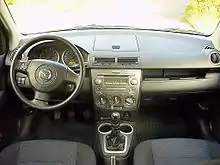
The badge-engineered Ford version, the Ford Fusion, is no longer made, as Ford began importing the Ford Fiesta on the global Ford B3 platform which is based on Mazda's DY platform.[5] Production of the car for European market started at Almussafes Ford plant in Valencia, Spain on 20 January 2003.[6]
All Demios come with ABS and EBD, and stability control is optional. An innovative feature offered in Japan is e-4WD, a hybrid car-type system which uses an electric motor to power the rear wheels of this front wheel drive vehicle when needed. In the Demio, this system is used only as a traction aid, not for increased fuel economy as in most other vehicles.
There is also a big difference in floor pan and pedal box. The European-exclusive version of Mazda2 (DY) uses a pedal box directly sourced from Ford Fiesta rather than their own 4x108 bolt pattern instead of 4x100.
Three trim levels were available in Japan, Cozy, Sport, and Casual.
In Europe, trim levels were S, TS and TS2. The TS and TS2 were renamed Antares and Capella in 2004. The Japanese 1.3 and 1.5 gasoline engines are not available, but Ford's 1.25-liter 16-valve Sigma engine is used, and Mazda's 1.4 and 1.6 gasoline, plus Fords 1.4 TDCi diesel are offered but called 1.4 CDTi by Mazda. (Virtually all the engine parts are interchangeable with the 1.4 diesel version of the Ford Fiesta and Ford Fusion of the same period).
The Mazda2 is sold with a variety of Z-family engines:
Mazda Demio:
- 1.3 L ZJ-VE I4 91 PS (67 kW; 90 hp) at 6000 rpm, 12.6 kg⋅m (124 N⋅m; 91 lb⋅ft) at 3500 rpm
- 1.5 L ZY-VE I4 113 PS (83 kW; 111 hp) at 6000 rpm, 14.3 kg⋅m (140 N⋅m; 103 lb⋅ft) at 4000 rpm
Mazda2:
- 1.25 L MZI C2 70 PS (51 kW; 69 hp) at 5700 rpm, 110 N⋅m (81 lbf⋅ft) at 3500 rpm
- 1.4 L MZI C4 80 PS (59 kW; 79 hp) at 5700 rpm, 124 N⋅m (91 lbf⋅ft) at 3500 rpm
- 1.6 L MZI C6 100 PS (74 kW; 99 hp) at 6000 rpm, 146 N⋅m (108 lbf⋅ft) at 4000 rpm
- 1.4 L MZ-CDTi Diesel 68 PS (50 kW; 67 hp) at 4000 rpm, 160 N⋅m (120 lbf⋅ft) at 2000 rpm
In 2004 Mazda introduced the Verisa in Japan. The Verisa is based on the Demio but targeted further upmarket.
Safety
Gallery
 2005-2007 Mazda Demio hatchback (Japan)
2005-2007 Mazda Demio hatchback (Japan)_Genki_hatchback_01.jpg.webp) 2005–2007 Mazda2 (DY Series 2) Genki hatchback (Australia)
2005–2007 Mazda2 (DY Series 2) Genki hatchback (Australia)_Genki_hatchback_02.jpg.webp) 2005–2007 Mazda2 (DY Series 2) Genki hatchback (Australia)
2005–2007 Mazda2 (DY Series 2) Genki hatchback (Australia)
Third generation (DE; 2007)
| Third generation (DE) | |
|---|---|
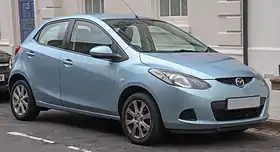 | |
| Overview | |
| Also called | Mazda2 |
| Production | May 2007 – July 2014 |
| Assembly | |
| Body and chassis | |
| Body style | |
| Platform | Mazda DE platform |
| Related | |
| Powertrain | |
| Engine | |
| Transmission | |
| Dimensions | |
| Wheelbase | 2,490 mm (98.0 in) (2007–2010) 2,492 mm (98 in) (2011–) |
| Length | 3,885 mm (153.0 in) (hatchback, 2007–2010) 3,895 mm (153.3 in) (Genki) 3,950 mm (156 in) (2011–, hatchback) 4,270 mm (168.1 in) (sedan) |
| Width | 1,695 mm (66.7 in) |
| Height | 1,475 mm (58.1 in) (hatchback) 1,480 mm (58.3 in) (sedan) |
| Curb weight | 1,038 kg (2,288.4 lb) (hatchback) 1,053 kg (2,321.5 lb) (sedan) |
The third generation Demio is built on the new DE platform, which Ford also used for the 2008 Ford Fiesta. It employs lightweight materials and reduces the overall dimensions of the car. This generation dropped the mini MPV high-roof styling adopted by its predecessor, instead opting for a more conventional hatchback look. The lead designer for the third generation was Ikuo Maeda, who was later promoted to Head of Design at Mazda in 2009.[10]
The Mazda2 launched at the 2007 Geneva Motor Show,[11][12] and later at the 2007 Shanghai International Motor Show.[13][14][15] For the Japanese domestic market, sales of the production vehicles began on 5 July 2007 at Mazda, Mazda ɛ̃fini and Autozam dealers.[16]
A three-door variant was released for the European market in 2008. Engine choices include the MZR 1.3-liter and 1.5-liter gasoline, MZ-CD 1.4-liter common-rail turbo diesel. In some EU Member States like the Netherlands, there is the option to buy the gasoline car in bi-fuel LPG version from the factory. This model was unveiled at the 2008 Geneva Motor Show.[17][18]
The North American version of the Mazda2 debuted at the 2009 LA Auto Show,[19] and later at the 2010 Canadian International AutoShow.[20] The Mazda2 became available in July, 2010 with the 1.5-liter, 100 hp four-cylinder and 5-speed manual or 4-speed automatic transmission.[21] Mazda discontinued the Mazda2 in the United States after the 2014 model year.[22]
The Chinese model of the Mazda2 in five-door hatchback body style launched at the 2007 Guangzhou Motor Show.[23] A Chinese four-door sedan model of the Mazda2 was unveiled at the same event,[24] with sales beginning in January, 2008.[25]
The sedan body style was manufactured in Thailand and China and marketed only in Southeast Asia, Oceania, South America and the Caribbean.
In Australia, the sedan was introduced along with the facelifted hatchback in May 2010, with the sedan version being offered in a single 'Maxx' grade. In February 2011, Mazda Australia had reverted to Japanese sourced production, which led to the discontinuation of the sedan being offered after just 9 months on-sale.
Gallery
_Neo_3-door_hatchback_(2015-07-15)_02.jpg.webp) Mazda2 3-door (pre-facelift)
Mazda2 3-door (pre-facelift)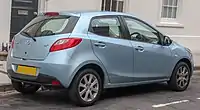 Mazda2 5-door (pre-facelift)
Mazda2 5-door (pre-facelift)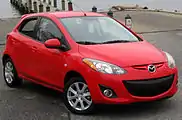 Mazda2 5-door (facelift)
Mazda2 5-door (facelift)_Neo_5-door_hatchback_(2015-07-24)_02.jpg.webp) Mazda2 5-door (facelift)
Mazda2 5-door (facelift)_Maxx_sedan_(2015-11-11)_02.jpg.webp) Mazda2 sedan
Mazda2 sedan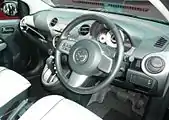 Interior
Interior
Engines
| Model | Years | Engine type | Power, torque@rpm |
|---|---|---|---|
| Gasoline engines | |||
| 1.3L (Miller Cycle) | 2007– | 1,349 cc (82.3 cu in) I4 (ZJ-VEM) | 90 PS (66 kW; 89 hp)@6000, 120 N⋅m (89 lb⋅ft)@4000 |
| 1.3L MZR (Low Power) | 2007– | 1,349 cc (82.3 cu in) I4 (ZJ-VE MZR) | 75 PS (55 kW; 74 hp)@6000, 121 N⋅m (89 lb⋅ft)@3500 |
| 1.3L MZR (ZJ-VE) | 2007– | 1,349 cc (82.3 cu in) I4 (ZJ-VE) | 87 PS (64 kW; 86 hp)@6000, 124 N⋅m (91 lb⋅ft)@3500 |
| 1.3L MZR | 2007– | 1,349 cc (82.3 cu in) I4 (ZJ-VE MZR) | 86 PS (63 kW; 85 hp)@6000, 122 N⋅m (90 lb⋅ft)@3500 |
| 1.5L MZR (ZY-VE) | 2007– | 1,498 cc (91.4 cu in) I4 (ZY-VE) | 103 PS (76 kW; 102 hp)@6000, 140 N⋅m (103 lb⋅ft)@4000 |
| 1.5L MZR | 2007– | 1,498 cc (91.4 cu in) I4 (ZY-VE MZR) | 102 PS (75 kW; 101 hp)@6000, 137 N⋅m (101 lb⋅ft)@4500 |
| Diesel engines | |||
| 1.4L MZ-CD | 2007– | 1,399 cc (85.4 cu in) I4 turbo (Y4) | 68 PS (50 kW; 67 hp)@4000, 160 N⋅m (118 lb⋅ft)@2000 |
| 1.6L MZ-CD | 2009– | 1,560 cc (95.2 cu in) I4 turbo (Y6) | 90 PS (66 kW; 89 hp)@4000, 212 N⋅m (156 lb⋅ft)@1750 |
Transmissions
Transmission choices include a five speed manual, a four speed automatic, a CVT (only available in Japan and Hong Kong) or a CVT with a sport mode featuring seven simulated ratios and paddle shifters (only available in Japan).[26][27][28]
Equipment
A digital fuel gauge is a standard feature and stability control is available, except in Australia, where it is standard. There are three trim levels available for the new Mazda2 range: the Neo base model with air-conditioning and 15-inch steel wheels and the range-topping Genki model with side airbags, 16-inch alloy wheels and a sports body kit.[29]
Safety
The Mazda2 received a "Good" rating from the Insurance Institute for Highway Safety in frontal crashes, "Acceptable" for side crashes, "Good" for roof strength, and "Acceptable" for rear crash protection.[30]
Production
The vehicles were built in Ujina Plant No.1 (U1) in Hiroshima, with additional Mazda2 began at the Ujina Plant No.2 (U2) in June 2007.[32] Additional vehicles were built in Hofu, Japan.[33]
Chinese models were built in Changan Ford Mazda Automobile's Nanjing plant at the end of October 2007.[34]
Asia-Pacific region models were produced by AutoAlliance Thailand Co., Ltd. beginning in 2009.[35][36] Mazda2 local assembly in Vietnam began in October 2011 at the Nui Thanh, Quang Nam plant owned by Vina Mazda Automobile Manufacturing Co., Ltd.[37][38]
Sales
A month after sales of Japanese models began 15,000 units were sold, with the top 3 selling models featuring Sunlight Silver Metallic, Metropolitan Grey Mica and Icy Blue Metallic body colors, and Spirited Green Metallic body among the top 5.[39]
Production in Japan reached 100,000 units at the end of January 2008.[40][41]
In August 2010, it is reported that 400,000 units has been sold in Europe, Australia and Japan.[42]
| Calendar Year | U.S.[43] | Europe[44] | Japan | China[45] |
|---|---|---|---|---|
| 2008 | 72,638 | 13,692 | ||
| 2009 | 75,425 | 22,634 | ||
| 2010 | 3,021 | 52,838 | 65,949[46] | 21,680 |
| 2011 | 13,952 | 38,251 | 61,736[47] | 8,981 |
| 2012 | 19,315 | 30,023 | 57,820[48] | 3,049 |
| 2013 | 11,757 | 23,604 | 43,573[49] | 1,345 |
| 2014 | 996 |
Japanese models
Updated models include premium seat upholstery, black meter panel, silver instrument panel garnish, expanded exterior body colors including Burgundy Red Mica, standard trip computer. The 15C (with CVT), 13C-V and 13C (with a four-speed electronically controlled automatic transmission) models include Mazda's eco-lamp. Sport, 15C, 13C-V and 13C (with e-4WD) model grades include new three-point seatbelt and headrest on the second-row center seat as standard equipment. SPORT model includes 16-inch alloy wheels.
The 13-SkyActiv model includes the first SkyActiv engine, a 1.3-liter with 83 hp (62 kW) and 83 lb·ft (113 N·m) of torque, intelligent-Drive Master (i-DM), CVT transmission, 14-inch alloy wheels, Aquatic Blue Mica exterior body color option, dynamic stability control with brake assist, traction control.
Preorders of the new model began on 9 June 2011,[50][51] while sales of the new model began on 30 June 2011.[52][53]
The Demio 13-SkyActiv was nominated for Car of The Year Japan in 2012.[54]
2011 SEMA concepts (2011)
The Turbo2 is a concept car based on the Demio. It features a MAZDASPEED3 MZR 2.3-liter Direct Injection Spark Ignition (DISI) turbo engine, H&R coil-over suspension kit, Corksport sway bars and customized Brembo front brakes with 13-inch ventilated and slotted rotors, gloss black 17-inch OZ Racing wheels with Yokohama ADVAN Neova 215/40R17 performance tires, Sonic White tri-coat body colour with Brilliant Black on the lower panels, wheel arches, side skirts and lower front fascia; bright green and neon yellow graphics and trim pieces; Katzin black leather seats featuring Barracuda Yellow perforated leather inserts and Sunrise Yellow seat piping, Star West floor mats, AiM Pista MXL digital racing performance and data acquisition display.
The 3dCarbon Mazda2 includes a 3dCarbon/Air Design body kit manufactured in high-pressure polyurethane injection molding (a front air dam, side skirts, a rear lower diffuser and Mazda2 Touring-spec upper rear spoiler), Spirited Green Metallic body-color with vinyl graphic design by Sticky Fingers Design, darkly tinted windows, 3M Color Stable Metal-Free Window Film on the side and rear windows, front windshield with 3M Crystalline Nanofilm, Eibach Springs Pro-Kit and 18-inch FIVE:AD S6:F Gunmetal wheels with Yokohama S.drive 215/35R18 tires.
The vehicles were unveiled at the 2011 SEMA Show.[55]
Demio EV (2012–)
The Demio EV is a limited (100 leased units) production electric vehicle for the Japanese market. It includes a 346-Volt 20kWh lithium-ion battery with 200 km (124 mi) driving range. Leasing began in October 2012.[56][57] 70% of Mazda2 BEV owners said they weren't happy with the 124-mile range of their electric car, even though they never needed more.[58]
Prototype Range Extender for EV (2013)
The range extender test car was a version of the Mazda2 prototype electric car with a 0.33-liter rotary engine, lithium-ion batteries, 75 kW electric motor driving front wheels and 10-liter fuel tank.[58] This would double the range of the Demio EV, meeting Japanese requirements that the fuel tank and engine not provide more range than the electric motor. The 1,280 kg (2,820 lb) car would have a 200 kg (440 lb), 20 kWh lithium-ion battery pack, powering a 75 kW (102 PS; 101 hp) / 150 N⋅m (15 kg⋅m; 110 lb⋅ft) electric motor. The prototype range extender incorporates a 28 kW (38 PS; 38 hp) rotary engine generator, a lightweight 100 kg (220 lb) downsized single-rotor Wankel engine with 330 cc (20 cu in) displacement mounted on its side in the rear of the car. A 10 L (2.2 imp gal; 2.6 US gal) fuel tank that can be filled with gasoline, butane, or propane was claimed to almost double the EV range to 380 kilometres (236.1 mi).[59]
Fourth generation (DJ; 2014)
| Fourth generation (DJ) | |
|---|---|
_Genki_hatchback_(2015-08-07)_01.jpg.webp) | |
| Overview | |
| Also called |
|
| Production | 2014–present |
| Assembly |
|
| Designer | Ikuo Maeda |
| Body and chassis | |
| Body style | |
| Platform | Mazda DJ platform |
| Related | |
| Powertrain | |
| Engine |
|
| Transmission |
|
| Dimensions | |
| Wheelbase | 2,570 mm (101.2 in) |
| Length | 4,060 mm (159.8 in) (hatchback) 4,320 mm (170.1 in) (sedan) |
| Width | 1,695 mm (66.7 in) |
| Height | 1,495 mm (58.9 in) (hatchback) 1,470 mm (57.9 in) (sedan) |
| Curb weight | 1,025 kg (2,259.7 lb) (hatchback) 1,045 kg (2,303.8 lb) (sedan) 1,280 kg (2,821.9 lb) (EV hatchback) |
| Chronology | |
| Predecessor | Scion xD (for Scion iA, North America) |
_Genki_hatchback_(2015-08-07)_02.jpg.webp)
_1.5_Standard_sedan_(2017-11-29).jpg.webp)

.jpg.webp)
.jpg.webp)
Reports of a new generation of the Mazda Demio emerged in 2013[62] for a 2014 launch, with some manufacturing at the new Mazda plant in Mexico.[61][63] The Mazda Hazumi Concept model (designed to preview the future Mazda2 models) was unveiled at the 2014 Geneva Motor Show[64] and in April 2014 the development mule of the new generation Demio was undergoing testing in Germany, covered in camouflage.[65][66][67]
In July 2014, Mazda presented photos of the fourth generation Demio hatchback,[68] and production began at Mazda's Hōfu plant.[69] Sales in Japan began in September 2014. The sedan version debuted at the Thailand International Motor Expo in November 2014.[70][71]
The fourth generation is based on a variation of Mazda's CX-5 platform, rather than the DE platform used on the Ford Fiesta[72] and features greater length, wider front and rear tracks, decreased interior room for rear-seat occupants and less front head and legroom.[73]
In 2014, the Mazda de México Vehicle Operation (MMVO) factory in Salamanca, Guanajuato began production of the Mazda2 for various North and South American markets.[74]
In October 2014, the Demio was awarded the 2014–2015 "Car of the Year" by the Japan Car of the Year Committee.[2]
Despite the Mazda2 being produced in North America, at the new Mexico plant, Mazda announced that it would not sell the vehicle in Canada or the United States (except in Puerto Rico). Instead, the Mazda2 would be sold by Toyota Motor North America in those markets between 2016 and 2020 (see section below).[75][76]
The Demio nameplate was discontinued in all remaining markets in September 2019, and replaced by the Mazda2 moniker worldwide.[77]
The fourth-generation received a facelift for the 2020 model year with various exterior changes, interior trim changes, revised suspension tuning to improve ride quality, improvements to the engine deceleration energy recovery system, adaptive headlights, and standard G-Vectoring Control Plus.[77] With Toyota discontinuing its marketing of the Mazda2, the vehicle finally went on sale in Mexico, where it is produced. The facelift model went on sale in Mexico in October 2019 for the 2020 model year. It comes in three versions: i, i Touring, and i Grand Touring with automatic transmission.[78]
According to reports by British car magazine Autocar, a Yaris-based Mazda2 model will replace the DJ model by 2022–2023.[79]
Engines and transmission
The Mazda2 uses Mazda's SkyActiv-Drive six-speed automatic and SkyActiv-MT five- and six-speed manual gearboxes[80] as well as stop-start technology ("i-STOP" turns the engine off when the car is stationary) and a brake energy regeneration system ("i-ELOOP" uses braking to charge a capacitor for all car electronics, in place of an alternator charging a battery).[80]
The Mazda2 is initially offered with a 1.5-liter gasoline engine and a 1.5-liter diesel engine—the SkyActiv-D, 1.5-liter diesel engine debuted at the 2014 Geneva Motor Show.[64] The gasoline engine will be available with 74 bhp, 89 bhp or 113 bhp, while the diesel will produce 104 bhp.
| Model | Years | Engine type | Power, torque@rpm |
|---|---|---|---|
| Gasoline engines | |||
| 1.3L Skyactiv-G | 2014– | 1,298 cc (79.2 cu in) I4 (P3-VPS) | 93 PS (68 kW; 92 hp)@5800, 123 N⋅m (91 lb⋅ft)@4000 |
| 1.5L Skyactiv-G | 2014– | 1,496 cc (91.3 cu in) I4 (P5-VPS) | 115 PS (85 kW; 113 hp)@6000, 148 N⋅m (109 lb⋅ft)@4000 |
| Diesel engines | |||
| 1.5L Skyactiv-D | 2014– | 1,499 cc (91.5 cu in) I4 turbo (S5-DPTS) | 105 PS (77 kW; 104 hp)@4000, 250 N⋅m (184 lb⋅ft)@1500–2000 |
| Hybrid engines | |||
| 1.5L Skyactiv-G | 2014– | 1,499 cc (91.5 cu in) I4 Hybrid (Hybrid F-P5) | 110 PS (81 kW; 108 hp)@6000, 141 N⋅m (104 lb⋅ft)@4000 |
Scion iA and Toyota Yaris (North America)
.jpg.webp)



While the Mazda2 is produced in North America at Mazda's plant in Mexico, the company neither sell the vehicle in Canada nor the United States (except in Puerto Rico). Instead, the Mazda2 would be sold by Toyota Motor North America in those markets between 2016 and 2020.[75][76]
In Canada, the vehicle was sold as the Yaris Sedan across all model years.[81] Mazda initially announced at the 2015 Montreal International Auto Show that it would offer the Mazda2 in the market, but canceled the rollout on 16 November 2015, and shifted the rollout to Toyota.
In Mexico, the vehicle was sold as the Yaris R, alongside the more austere and lower-priced Yaris Sedán (a variant of the Vios and later the Yaris ATIV). The Yaris R sold in three versions.[82]
In the United States, the sedan was sold under several names. In the initial 2016 model year, it was marketed under Toyota's youth-oriented Scion brand as the Scion iA, where it was the only 4-door sedan and only model not to be built in Japan to be marketed under the brand. After discontinuing the Scion brand, the car was rebranded as the Yaris iA for the 2017 and 2018 model years.[83] For the 2019 and 2020 model years, the sedan was rebranded again as the Yaris Sedan.[84]
When first introduced, like all Scion vehicle, the iA only had one trim level (single-spec) and only offered buyers a choice of exterior color and a choice between 6-speed manual and 6-speed automatic transmissions.[85] For the 2019 and 2020 model years (as it was rebranded as the Yaris Sedan in the US) the sedan received a minor facelift and introduced L, LE and XLE trim levels with a variety of interior and exterior options.[86]
The hatchback variant of the Mazda2 was not initially sold by Toyota, which instead offered a Yaris Liftback based on the Toyota Vitz (XP130). When the Vitz was discontinued, Toyota announced at the 2019 New York International Auto Show that a model called Yaris Hatchback, based on the Mazda2, would go on sale in 2019 for the 2020 model year.[87][88]
Exports of both the Yaris Sedan and Hatchback to the United States were stopped in June 2020 due to new regulations and slow sales.[89] In July, Toyota Canada also confirmed the cancellation in the Canadian market.[90] It was also discontinued in Mexico on August 27, 2020, leaving only the Thai-imported XP150 series Yaris and Yaris Sedán as its indirect replacements.[91]
Safety
| Test | Points | % |
|---|---|---|
| Overall: | ||
| Adult occupant: | 32.8 | 86% |
| Child occupant: | 38.5 | 78% |
| Pedestrian: | 30.3 | 84% |
| Safety assist: | 8.3 | 64% |
Sales
| Calendar Year | U.S. (as Scion iA/Yaris iA)[92] | Europe[44] | Japan | Australia | Thailand |
|---|---|---|---|---|---|
| 2014 | 24,289 | 48,564[93] | 13,424 | 6,801[94] | |
| 2015 | 7,605 | 35,478 | 72,771[95] | 14,511 | 19,091[96] |
| 2016 | 27,982 | 36,463 | 57,320[97] | 13,639 | 23,223[98] |
| 2017 | 35,727 | 31,703 | 49,302[99] | 12,101 | 31,760[100] |
| 2018 | 25,115 | 32,246 | 48,182[101] | 9,542 | 45,972[102] |
| 2019 | 21,916 | 37,346 | 8,198[103] | 41,987 | |
References
- "World Car of the Year Awards". World Car Awards. 2008. Archived from the original on 17 March 2018. Retrieved 18 March 2016.
- De Guzman, Marcus (13 October 2014). "All-new Mazda2/Demio wins the Japanese Car of The Year award". Autoindustriya.com. Retrieved 13 October 2014.
- "Mazda Style: 25 Years of Design". WorldCarFans. 15 May 2006. Retrieved 11 February 2016.
- "Major production facilities in Japan". Archived from the original on 29 December 2010.
- Yamaguchi, Jack (1 December 2002). "Mazda2/Demio based on Fiesta". SAE International. Archived from the original on 28 August 2005.
- País, Ediciones El (21 January 2003). "Mazda empieza a fabricar desde Ford Almussafes con la idea de ampliar su apuesta por la planta valenciana". EL PAÍS (in Spanish). Retrieved 21 May 2017.
- "Euro NCAP results for Mazda2". euroncap.com. 2003.
- มาสด้า 2 เปิดไลน์ผลิตใหม่ในเวียตนาม (in Thai). Manager Online. 26 October 2011. Retrieved 26 October 2011.
- "MAZDA: Pre-Orders Start for Facelifted Mazda Demio in Japan - News Releases". Mazda. Retrieved 15 December 2020.
- Nik Berg (ed), Elliot Lewis-George (2013). "Mazda Heroes No. 1 – Ikuo Maeda". Zoom-Zoom Magazine (16): 6. Retrieved 15 May 2013.CS1 maint: uses authors parameter (link)
- Lavrinc, Damon (13 February 2007). "Geneva Preview: Mazda2 teaser". Autoblog.com. Retrieved 18 October 2010.
- "All-new Mazda2 to Debut at the 2007 Geneva International Motor Show". Mazda.com. 20 February 2007. Archived from the original on 30 September 2010. Retrieved 18 October 2010.
- "Mazda to Exhibit Ryuga Concept Car at the 2007 Shanghai International Motor Show". Mazda.com. 27 March 2007. Archived from the original on 3 December 2010. Retrieved 18 October 2010.
- "マツダ、ジュネーブモーターショーに新型『Mazda2』を出品". Mazda. Archived from the original on 15 February 2014. Retrieved 26 July 2012.
- "All-new Mazda2 to Debut at the 2007 Geneva International Motor Show". Mazda. Archived from the original on 30 September 2010.
- "Mazda Commences Sales of Fully Redesigned Demio". Mazda.com. Archived from the original on 25 September 2010. Retrieved 18 October 2010.
- "New Mazda2 Three-Door Hatchback at the 2008 Geneva International Motor Show". Mazda.
- "マツダ、ジュネーブモーターショーに新型「Mazda2」 3ドアハッチバックを出品". Mazda.
- "LA 2009: Mazda unveils North American spec Mazda2 for 2011".
- "Upgraded North American Mazda2 interior revealed in Toronto, car to launch late summer".
- Burdick, Chris (2 April 2010). "2011 Mazda2 Starting at $13,980 – Details Announced". Automoblog.net. Retrieved 5 March 2016.
- Estrada, Zac (24 May 2015). "New Mazda 2 Won't Be Offered To American Buyers, At Least Not As A Mazda". Carscoops. Retrieved 22 July 2016.
- "All-new Mazda2 and Mazda5 for the Chinese Market on Display at the 2007 Guangzhou Motor Show". Mazda. Archived from the original on 19 April 2012.
- Neff, John (19 November 2007). "Mazda2 sedan unveiled in China". Autoblog.com. Retrieved 18 October 2010.
- "Mazda to Showcase All-New Mazda2 Sedan World Premiere at the 2007 Guangzhou Motor Show". Mazda.com. 19 November 2007. Archived from the original on 3 December 2010. Retrieved 18 October 2010.
- "Mazda Japan official site specifications for Mazda Demio". Demio.mazda.co.jp. Retrieved 18 October 2010.
- "Mazda Australia official site specifications for Mazda 2". Mazda.com.au. Retrieved 18 October 2010.
- "Mazda Hong Kong official site specifications for Mazda 2". Mazda2.com.hk. Archived from the original on 28 July 2010. Retrieved 18 October 2010.
- "two sexy". Wheels Magazine. July 2007. pp. 60–64.
- "IIHS-HLDI: Mazda 2". Archived from the original on 22 March 2011. Retrieved 8 January 2011.
- "Euro NCAP results for Mazda2". euroncap.com. 2007.
- "All-New Mazda2 Rolls Off Production Line at Ujina Plant No.1". Mazda.com. 21 May 2007. Archived from the original on 3 December 2010. Retrieved 18 October 2010.
- "Mazda2 Stops at Valencia". Euroautotrends.com. 4 December 2006. Archived from the original on 10 July 2011. Retrieved 18 October 2010.
- "Mazda to Produce All-New Mazda2 for the Chinese Market at Changan Ford Mazda Automobile Nanjing Plant". Mazda.com. 19 April 2007. Archived from the original on 3 December 2010. Retrieved 18 October 2010.
- "Mazda Commences Production of Mazda2 at New Passenger Car Plant in Thailand". Mazda.com. Retrieved 18 October 2010.
- "AutoAlliance Thailand Inaugurates New Passenger Car Plant". Mazda.com. 13 July 2009. Retrieved 18 October 2010.
- "Mazda2 Local Assembly Begins at New Vietnam Plant". Mazda. Archived from the original on 17 January 2013. Retrieved 25 July 2012.
- "マツダ、ベトナムの新工場で「Mazda2」の現地組立を開始". Mazda.
- "All-New Mazda Demio Sales Take Off in Japan". Mazda.com. 5 July 2007. Archived from the original on 3 December 2010. Retrieved 18 October 2010.
- "Mazda Produces 100,000th All-New Demio in Japan". Mazda.
- "新型「マツダデミオ」、国内累計生産台数10万台を達成". Mazda.
- Carpenter, Susan (12 August 2010). "2011 Mazda2 is an entry-level blast". Los Angeles Times.
- "Mazda2 US car sales figures". carsalesbase.com. Retrieved 11 November 2018.
- "Mazda2 European sales figures". carsalesbase.com. Retrieved 11 November 2018.
- "Mazda2 China auto sales figures". carsalesbase.com. Retrieved 11 November 2018.
- "2010 Japan: Best-Selling Car Models". Car Sales Statistics. 17 January 2011. Retrieved 10 August 2019.
- "2011 Full Year Best-Selling Car Models in Japan". Car Sales Statistics. 11 January 2012. Retrieved 10 August 2019.
- "2012 (Full Year) Japan: Best-Selling Car Models". Car Sales Statistics. 10 January 2013. Retrieved 10 August 2019.
- "2013 (Full Year) Japan: Best-Selling Car Models". Car Sales Statistics. 9 January 2014. Retrieved 10 August 2019.
- "新型「マツダ デミオ」の予約受注を開始". Mazda.
- "Pre-Orders Start for Facelifted Mazda Demio in Japan". Mazda.
- "Facelifted Mazda Demio Goes on Sale in Japan". Mazda News Releases.
- "新型「マツダ デミオ」を発売 -「走りの楽しさ」の進化とクラストップの30.0 km/L(10・15モード燃費)の低燃費を実現-".
- "Car of the Year Japan 2012 Top Ten Contenders Announced". Integrity Exports. 14 November 2011. Retrieved 14 November 2011.
- Zach Bowman. "Mazda MX-5 Miata Spyder and Super 20 Concepts land in Las Vegas". Autoblog.com. Retrieved 29 September 2012.
- "Mazda to Lease 'Demio EV' Electric Vehicle in Japan from October". Mazda.
- "マツダ、電気自動車「デミオEV」のリース販売を10月から開始". Mazda. Archived from the original on 12 July 2012. Retrieved 25 July 2012.
- Jonathon Ramsey. "Mazda2 with extended-range hybrid rotary tech shown". Autoblog.
- "New Mazda2 to Plug in". 30 June 2014.
- Zuckerman, Roi (3 June 2015). "New Mazda2 in Israel: Starting from 100K₪". Ynet. Retrieved 9 February 2016.
- "Mazda Begins Construction of New Mexican Plant that will Produce the Mazda2 and Mazda3". Carscoops. 12 October 2011. Retrieved 5 November 2014.
- Matri, Andrea (17 July 2013). "New Mazda2 for the 2014, leaked". iCar Review. Retrieved 5 November 2014.
- "Next Mazda2 Won't Be Designed as a Bloke's Car, But it Will Get Crossover'd". Carscoops. 2 December 2013. Retrieved 5 November 2014.
- "Mazda Hazumi Concept". 2015carreviews.com. Retrieved 17 March 2014.
- Lee, Jonathan (4 April 2014). "SPYSHOTS: Third-gen Mazda 2 spotted in Europe". PaulTan.org. Retrieved 5 November 2014.
- Turkus, Brandon (15 April 2014). "2015 Mazda2 spotted on the road". Autoblog. Retrieved 5 November 2014.
- Tisshaw, Mark (24 April 2014). "New Mazda 2 spotted ahead of 2015 launch". Autocar. Retrieved 5 November 2014.
- "New 2015 Mazda2 Officially Breaks Cover [75 Photos & Videos]". Carscoops. 17 July 2014. Retrieved 5 November 2014.
- "Production of All-New Mazda2 Begins at Hofu Plant". Mazda. 17 July 2014. Retrieved 27 November 2014.
- Tipan, Eric (5 November 2014). "2015 Mazda 2 sedan to make global debut in Thailand". Autoindustriya.com. Retrieved 5 November 2014.
- "Mazda to Debut the All-new Mazda2 Sedan at Thailand International Motor Expo". Mazda.
- "Report Claims Next Mazda2 will Use Shortened Version of CX-5 Platform". Carscoops. 1 July 2013. Retrieved 5 November 2014.
- "New Mazda2 styled to turn heads".
- Santillán, Miriam (24 October 2014). "Mazda2 inicia producción en México" [Mazda2 starts production in Mexico] (in Spanish). Autocosmos. Retrieved 29 March 2018.
- Estrada, Zac (25 May 2015). "New Mazda 2 Won't be Offered to American Buyers, At Least Not as a Mazda". Carscoops. Retrieved 11 June 2015.
- "Media Statement Regarding Mazda2". Mazda Canada. 16 November 2015. Retrieved 15 December 2015.
- "The World Says Goodbye to the Mazda Demio". CarGuide.ph. 18 July 2019. Retrieved 18 July 2019.
- García, Gerardo (12 October 2019). "Mazda 2 2020: Precios, versiones y equipamiento en México" [Mazda 2 2020: Prices, versions and equipment in Mexico]. Motorpasión México (in Spanish). Mexico. Retrieved 12 October 2019.
- https://www.autocar.co.uk/car-news/new-cars/mazda-launch-own-version-new-toyota-yaris-2023
- "Mazda2 2014 release date, price & specs".
- Litwinenko, Jerrold (1 April 2015). "All-new 2016 Toyota Yaris sedan coming to Canada this fall". CTV News. Retrieved 29 March 2018.
- "Toyota anuncia producción del subcompacto Yaris R en México". Toyota Mexico. 27 July 2015. Archived from the original on 6 August 2015.
- Capparella, Joseph (17 March 2016). "Scion, Living On: Scion iM, iA To Be Renamed Toyota Corolla iM, Yaris iA". Car and Driver. Retrieved 17 March 2016.
- Fink, Greg (26 March 2018). "2019 Toyota Yaris Sedan Revealed: iA No More". Car & Driver. Retrieved 27 March 2018.
- Capparella, Joseph (December 2016). "2017 Toyota Yaris iA Manual". Car and Driver. Retrieved 27 March 2018.
- "2019 Yaris Sedan Offers Ideal Blend of Value and Fun" (Press release). US: Toyota. 26 March 2018. Retrieved 11 September 2018.
- Capparella, Joey (28 January 2019). "Toyota Is Replacing the Old Yaris with a Rebadged Mazda 2 Hatchback". Car and Driver. Retrieved 3 February 2019.
- "All-New 2020 Toyota Yaris Hatchback Combines Technology, Cargo Capacity and Practicality". toyota.ca. 5 April 2019. Retrieved 12 April 2019.
- Nichols, Beth (24 June 2020). "Toyota Confirms Yaris Sedan, Hatchback Are Dead to U.S." Car and Driver. Retrieved 24 June 2020.
- Deslauriers, Michel (7 July 2020). "Toyota Yaris Canned In Canada After U.S." Motor Illustrated. Retrieved 28 October 2020.
- https://www.motorpasion.com.mx/industria/toyota-yaris-r-descontinuado
- "Toyota Yaris sedan US car sales figures". carsalesbase.com. Retrieved 10 August 2019.
- "2014 (Full Year) Japan: Best-Selling Car Models". Car Sales Statistics. 8 January 2015. Retrieved 10 August 2019.
- "Thailand cars sales report 2014". HeadlightMag.com. Thailand. February 2015. Retrieved 24 October 2018.
- "2015 (Full Year) Japan: 30 Best-Selling Car Models". Car Sales Statistics. 8 January 2016. Retrieved 10 August 2019.
- "Thailand cars sales report 2015". HeadlightMag.com. Thailand. 10 June 2016. Retrieved 24 October 2018.
- "2016 (Full Year) Japan: 30 Best-Selling Car Models". Car Sales Statistics. 11 January 2017. Retrieved 10 August 2019.
- "Thailand cars sales report 2016". HeadlightMag.com. Thailand. 26 January 2017. Retrieved 24 October 2018.
- "2017 (Full Year) Japan: Best-Selling Car Models and Mini Cars". Car Sales Statistics. 11 January 2018. Retrieved 10 August 2019.
- "Thailand cars sales report 2017". HeadlightMag.com. Thailand. 29 January 2018. Retrieved 24 October 2018.
- "2018 (Full Year) Japan: Best-Selling Car Models and Mini Cars". Car Sales Statistics. 10 January 2019. Retrieved 10 August 2019.
- "Mazda sales report 2018". HeadlightMag.com. Thailand. 15 January 2018.
- "VFACTS: 2019 new car sales results | CarAdvice". CarAdvice.com. Retrieved 8 February 2020.